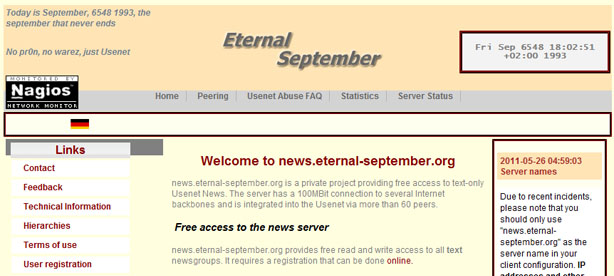The Changing Face Of The Usenet
August 15, 2011 | 08:57
Companies: #bit-tech #bt #newzbin #open-rights-group

Legitimately Using The Usenet Today
We asked deKay whether he ever used the Usenet for hosting binaries. I did set up a binaries group for posting stuff relating to the Sinclair Spectrum about 10 or 12 years ago,' he says, 'but it wasn't intended for piracy as such - more just to post games we'd written, cassette inlay scans, magazine scans and so on. Before that I used to post in some of the emulation binaries groups, but rarely downloaded anything - it was more for the chat really. My internet connection was too slow and expensive anyway - I've certainly never delved into the "0day" warez and film, TV and game downloads that seem to make up 99 per cent of the Usenet these days.'Now that we have Facebook and Twitter, and messageboards and forums are commonplace, has the number of regular posters on the Usenet declined notably since its heyday? 'Definitely,' says MerseyMal. 'In the case of comp.sys.sinclair, it’s more noticeable as quite a few people moved over to forums hosted by World Of Spectrum instead.' However, he notes that 'uk.media.dvd is a ghost town now.'
 The widespread use of social networking platforms such as FaceBook mean that few new people start using the Usenet today
The widespread use of social networking platforms such as FaceBook mean that few new people start using the Usenet todayAnother important factor in the declining use of the Usenet is that the people who still post on it generally tend to be people who've been using it for a long time – it attracts few new users to the discussion groups. 'It's rare that we get new posters,' says deKay, 'and people who are completely new to the Usenet, rather than people who already frequent other groups, are seemingly almost unheard of. Even I've dropped the number of groups I regularly post in from the 20 or so 10 years ago to only two main ones now, and a couple more in which I lurk.'
He also notes that 'at least one group I used to contribute to died a death a few years back due to trolling and spam. Thankfully, most of us just moved group. I think that sort of thing has always happened though.'
The wide availability of social networking platforms isn't the only reason for the decline in new people posting on the Usenet, though. The way in which it's accessed has also changed. Most ISPs used to offer a News (NNTP) server as standard, but this is now a rarity.
'I used to access via my ISP when I was with FreeUK, then Freeserve and then Virgin,' says deKay. 'My current ISP doesn't provide NNTP access, so for a few years I used a text-only news.individual.net service for around €10 a year. Then my ISP blocked it - I don't know why - they say they haven't but it doesn't work through them - so I use eternal-september.org instead, which is free. It is also text-only, but I don't miss binaries. Both Individual and Eternal September have great spam blocking - very little gets through.'
 Aware of the current problems with the Usenet, text-only Usenet service Eternal September promises 'No pr0n, no warez, just Usenet'
Aware of the current problems with the Usenet, text-only Usenet service Eternal September promises 'No pr0n, no warez, just Usenet'MerseyMal also points out that there are definite benefits to using the Usenet in comparison with modern forms of social networking. 'It has a cleaner interface than web forums,' he says. 'It's easier and quicker to navigate, and better-structured with regards to who’s replying to whom. Groups are also generally unmoderated, unlike forums.'
Despite this, it's clear that the Usenet's heyday as the Internet's number one discussion platform are over, and that its primary purpose now appears to be the anonymous hosting of large binary files. However, while blocking access to sites such as Newzbin won't have an impact on the Usenet as a discussion platform, the case sets a worrying standard – how long will it be before Usenet services are generally targeted, regardless of whether they're used for discussion or sharing binaries?
Do you still use the Usenet? If so, what do you use it for? Is BT blocking Newzbin the beginning of a slippery slope of web censorship? Let us know your thoughts in the forums.

MSI MPG Velox 100R Chassis Review
October 14 2021 | 15:04








Want to comment? Please log in.